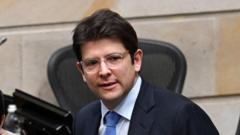As Bangladesh navigates a path to recover democracy after the fall of its authoritarian leader, Islamist hard-liners are increasingly vocal and gaining influence, calling for stricter adherence to Islamic norms and challenging the country’s secular history.
Islamist Extremism Gains Ground Amid Bangladesh's Political Shift

Islamist Extremism Gains Ground Amid Bangladesh's Political Shift
Amidst a political vacuum following authoritarian rule, Bangladesh witnesses a rise in Islamist extremism affecting women's rights and demanding a more theocratic government.
In the bustling streets of Dhaka, Bangladesh, a concerning trend is emerging from the political chaos that has ensued following the ousting of the nation's authoritarian regime. Since that pivotal moment, a faction of religious fundamentalists has emerged, demanding sweeping changes that threaten the secular fabric traditionally upheld by this nation of 175 million.
Across the country, reports have surfaced of Islamist groups asserting alarming control over societal norms, especially regarding women's freedoms. In one community, extremists have prohibited young women from engaging in soccer, imposing their views under the guise of ensuring "modesty." In another incident, a man accused of harassing a woman for her attire was publicly celebrated, revealing a troubling shift towards a culture that glorifies oppressive behavior.
Rallies organized by outspoken Islamist groups in the capital city have demonstrated a newfound audacity, with protesters threatening vigilantism unless the government imposes severe penalties — even death — for those they deem disrespectful to Islam. Amid the rising tide of extremism, calls for the establishment of an Islamic caliphate echo loudly, with these factions seeking to solidify their influence in a society grappling with political instability.
Concurrently, politicians tasked with framing a new Constitution face mounting pressure to abandon the secular principles that have historically defined Bangladesh. Conversations behind closed doors reveal discussions reflecting a shift towards pluralism interlaced with Islamic tenets — indicating a significant and potentially alarming alteration in the country's governance framework.
The intertwining of religious authority with state governance is on the rise, laying bare the underlying tensions within Bangladesh. As a nation that has long valued its secular identity, these developments demand urgent attention, not only from local authorities but also from the international community witnessing an ideological struggle that may reshape Bangladesh's future for generations to come.




















